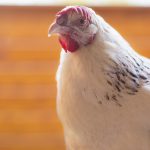Signs Of Egg-Eating Chickens And How To Solve It
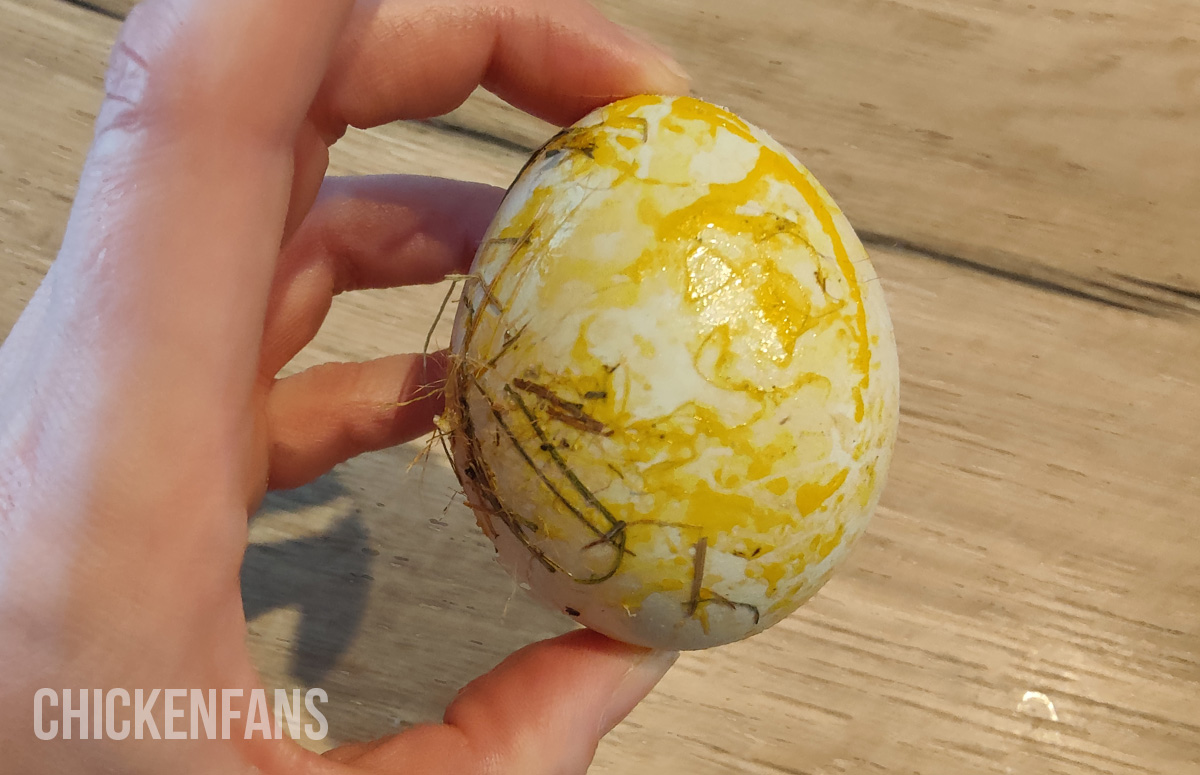
Many backyard chicken keepers raise chickens for their eggs. So picture this: one cheeky bird in your flock develops a sneaky taste for those delicious eggs. There is no doubt you’ll need to address the situation immediately.
Luckily, preventing this situation from happening in your backyard is not difficult. And in this case, prevention is better than cure. So if you want to find out what signs you need to look out for and what solutions are available, this article will help you understand everything you need to know.
Signs Of Egg-Eating Chickens
Egg-eating chickens are problematic for any backyard owner, as they reduce the number of eggs you can use at home or sell to consumers. That’s why you must spot the early signs before it becomes a habit hard to break.
Missing Eggs
If fewer eggs are in the nests for days in a row, you know something’s wrong. Of course, other factors can contribute to this, such as the season, the current health of the hens, and if they’re getting older.
But if your hens are young and healthy, they must lay the expected number of eggs during summer. If there are no eggs, you need to investigate things further.
Leftover Yolk Smeared Over Leftover Eggs
Egg-eating is a messy business. So if you find leftover yolk smeared all over the eggs while inspecting the nests, that’s a sign of an egg-eater in your flock.
At first, it can be hard to tell whether there’s any leftover yolk on the surface of the eggs or not. But it will become more noticeable after a few days, especially if the eggs have a darker shade.
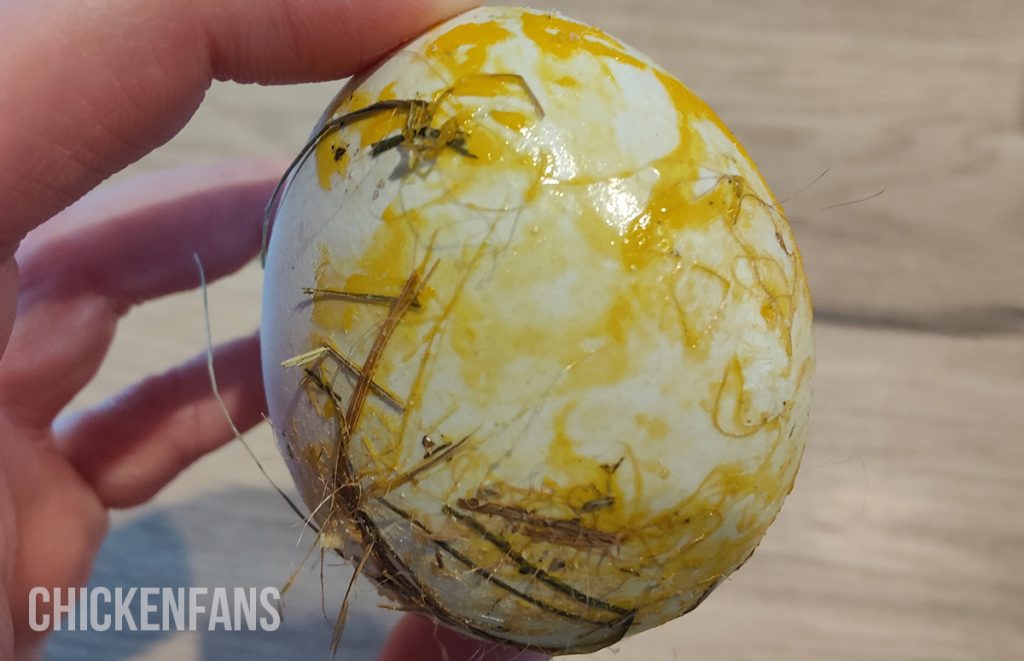
Dirty Nesting Boxes With Sticky Egg Yolk
If you spot signs of leftover egg yolk in nesting boxes, you know that one or a couple of your chickens are snacking on some eggs. That’s why you need to check all the nesting boxes, even the ones that don’t seem to have any eggs.
If one of your chickens gets an acquired taste for eggs, they will seek them out and have their fill of them. And afterward, the evidence will start piling up in their nesting space in the form of sticky feathers, leftover yolk smeared all over the walls of nesting boxes, and sometimes small pieces of eggshells in the vicinity.
Catch Them Red-Handed
The easiest way to spot whether or not there are egg-eating chickens in your flock is to catch them red-handed. However, you can’t always catch them in the act.
Instead, there are small signs to tell which birds are snacking on the eggs. The simplest way is to check the bird’s face. Check for any signs of leftover yolk on their beaks and neck feathers to tell which ones are the culprits.
Are Eggs Good For Chickens?
Eggs are immensely good for chickens because they are full of protein, which helps their growth and overall health. However, this only applies to cooked eggs. While raw eggs will give them the same nutritional value and benefits as cooked eggs, it’s not worth all the negatives attached to them.
For one, it teaches them to have an acquired taste for raw eggs. And once they start craving it, no egg is safe.
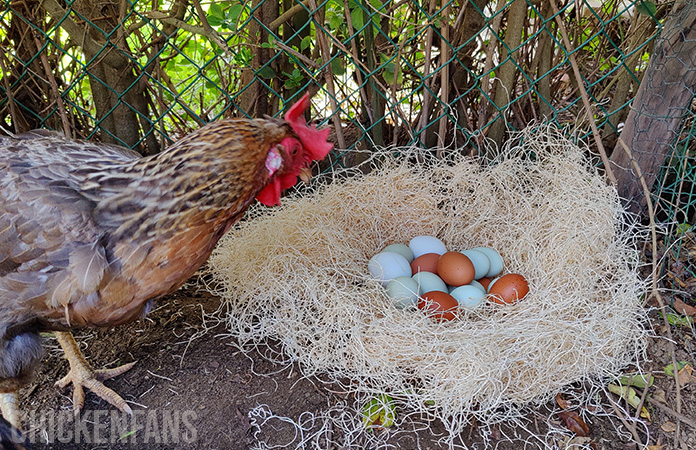
The worst part about it is that chickens are imitators. They tend to copy what other chickens do. So if one bird in your flock starts to develop a habit of eating eggs, the rest can follow its behavior.
How To Prevent Egg Eating Chickens?
There is no need to stress out when preventing the habit from forming in the first place. There are plenty of options available to you that you can apply in your backyard while taking care of a flock of chickens.
Take Out The Eggs Once/Twice A Day
The habit won’t form if there aren’t any eggs for them to eat. By taking away the eggs once or twice a day, you’re avoiding a situation where one of your chickens breaks into one by coincidence and starts to develop a taste for it.
Another reason you want to take the eggs out of the nest is to prevent breakage. If many eggs are inside a nest, that’s an open invitation for something to go wrong. Either one of the chickens starts poking at them for fun, or broody chickens can break one of the eggs, leading to one of them acquiring a taste for it.
Never Feed Them Whole Egg Shells
Eggshells are a good source of calcium that can help hens produce eggs with firm and hard shells. However, feeding them whole eggshells will also teach the hens that it’s okay for them to break other eggs to get the shells.
And if they do that and have a taste of the egg yolk, that will become a hard habit to break. To avoid this situation, some chicken keepers turn the egg shells into powder before adding them to the feed. You don’t need to blend them, but you must crush the eggshells before giving them to your flock.
Add A Calcium Supplement In The Feed
If you want the eggs your hens produce to have a firm and hard eggshells, feeding them a calcium supplement is a better solution than giving them eggshells. This way, you prevent the chickens from associating eggs with food for them to eat.
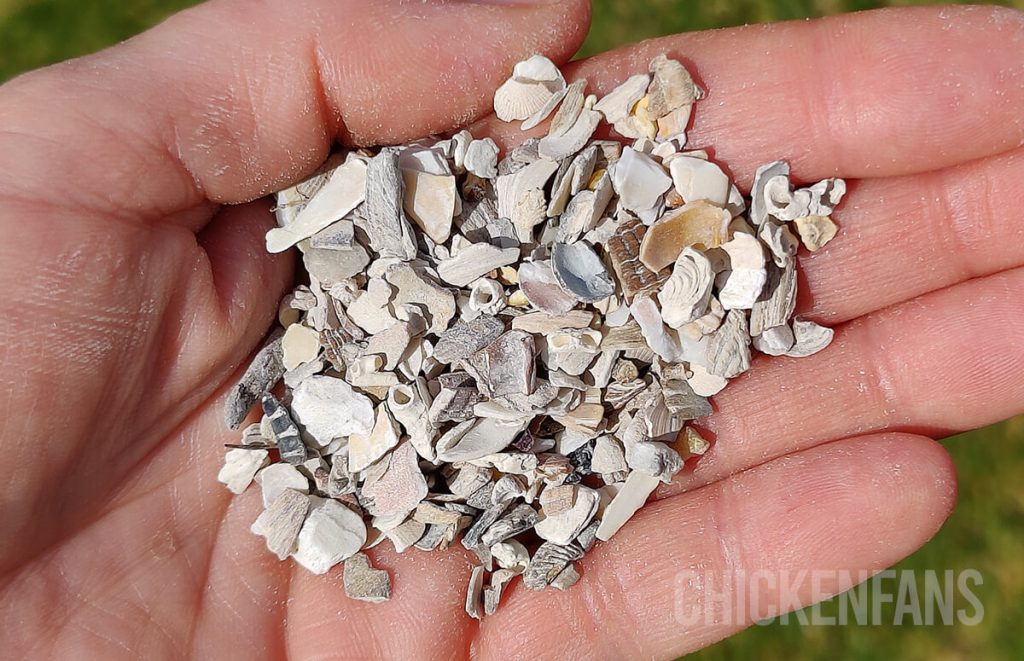
You must also remember that chickens will try to find and add more calcium to their diet if needed. So always feed your chickens a balanced diet to keep them happy and prevent them from turning to eggs as an alternative source of calcium.
Stores often sell a calcium supplement that you can feed to your chickens. Or, you can collect oyster shells, crush them, and then add crushed oyster shell powder to the chicken feed.
Provide Cushioning In The Nesting Areas
Eggs don’t just roll out of hens and settle gently into the nests. Normally, the hens will stand up when they’re about to lay an egg.
When that happens, the eggs will fall into the nest from a height of around a few inches. So if a freshly laid egg were to fall onto a hard surface, there’s a high chance it would crack and break apart. And from there, it’s just a matter of time for the egg-eating habit to develop.
To prevent this from happening, make sure to add a soft layer on top of the nest at all times. Adding a layer of straw or wood shavings that is two inches tall can help cushion freshly laid eggs. Or choose pre-cut, thick nesting box pads as a safe solution.
Solving Egg-Eating In Chickens
The preventive measures from earlier are not enough for those chickens that have already made a habit of eating eggs. You will need other methods to help break that habit with your chickens. And luckily, there are plenty of ways to do it, as many experienced chicken keepers can attest. But it will take some time and dedication to get the habit unlearned.
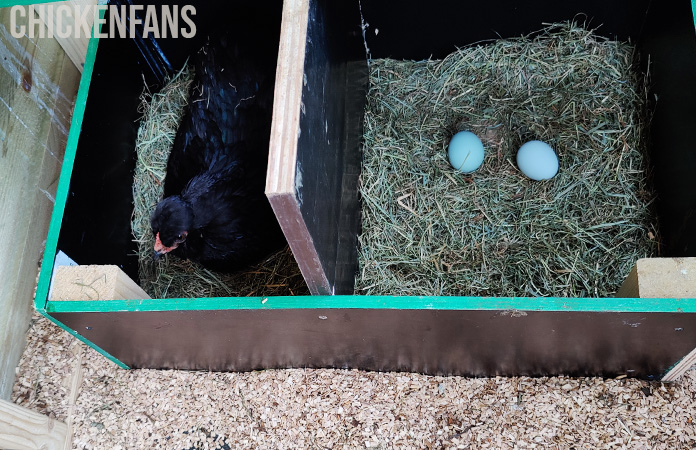
Special Nesting Boxes
One way to break the habit of your chicken eating eggs is to remove the eggs altogether. However, you can’t always be there to remove any freshly laid eggs.
Many experienced chicken keepers tend to build nest boxes that have a slope. This way, each time one of the hens lays an egg, the egg will drop down and roll away to a safe and secure location that is impossible for your chickens to reach.
This is the easiest and most successful way to stop your hens from eating their eggs.
Golf Balls In The Nests
If you don’t have time to renovate your chickens’ coops and nests, you can replace the eggs with something difficult for a chicken to break. One example of this is golf balls or fake eggs.
Not only are they similar to an egg in shape, size, and color, but they are also extremely hard and impossible for any chicken to break. After a few days of pecking at the golf balls, the chickens will soon learn to give up and turn their attention elsewhere.
Putting Mustard On Fake Eggs
According to many chicken keepers, one way to punish your chickens for eating eggs is by filling fake eggs with mustard. The taste of mustard is one that chickens are not fond of.
However, we must admit there is a lot of disagreement on this topic, so it’s best to try it out and see how it works with your flock. By emptying an egg with a broken shell and replacing the contents with mustard, it’s said they do not like the taste and stop cracking eggs.
Summary
Egg-eating chickens are not common in a flock. However, if a bird gets a taste of raw eggs, it can easily develop a habit leading to a decline in egg collecting. So always be on the lookout for chickens poking at eggs and trying to break into one to get that delicious yolk.
If you want to read more about chicken health problems, symptoms, and diseases, check out our ‘Health Page‘. You’ll find a ‘Symptom Checker‘, a complete list of ‘Chicken Behavior‘, and an overlook of the most common ‘Chicken Diseases‘. Or go to ‘The Classroom‘ and find a comprehensive list of all Chicken Fans articles.




